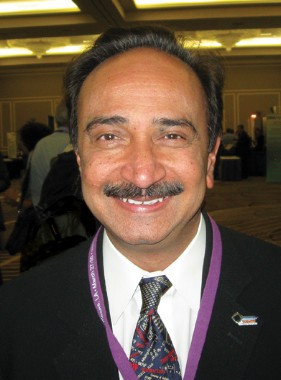User login
ORLANDO – The novel antidepressant vortioxetine proved safe, effective, and well tolerated for treatment of major depressive disorder specifically in elderly patients in a combined analysis of nine randomized, placebo-controlled clinical trials.
Only one of the trials was restricted to patients aged 65 years or older. This 8-week, double-blind study included 302 patients (mean age, 71 years) randomized to vortioxetine (Brintellix) at 5 mg once daily or placebo. From a baseline mean Hamilton Rating Scale-Depression score of 29.0, scores in the vortioxetine group fell by an average of 3.3 more points than in controls at 8 weeks. The response rate, defined as at least a 50% reduction in depression scores compared with baseline, was 53% in the vortioxetine group, compared with 35% with placebo.
Similarly, scores on the Montgomery-Åsberg Depression Rating Scale dropped by an average of 15.5 points in vortioxetine-treated patients, a significantly better performance than the 11.2-point reduction with placebo, Dr. Atul R. Mahableshwarkar reported at the annual meeting of the American Association for Geriatric Psychiatry.
The safety analysis incorporated the limited numbers of elderly patients in the other eight randomized, placebo-controlled, short-term studies. There were 286 patients over age 65 who received vortioxetine at 5-20 mg/day and 212 placebo-treated controls. The only side effect significantly more common in vortioxetine-treated patients than in controls was nausea, by a margin of 22.4% to 7.5%. There were no instances of treatment-emergent sexual dysfunction and no signal of increased suicidal ideation in these elderly patients on vortioxetine, according to Dr. Mahableshwarkar, senior medical director at Takeda Pharmaceuticals in Deerfield, Ill.
A clinical efficacy analysis couldn’t be done in any meaningful way for the nine-study overview because the patient numbers on any given dose were too small. While laboratory studies indicated that drug exposure was increased up to 30% in elderly patients, the wide therapeutic index of vortioxetine should make dose adjustments unnecessary, he added.
Vortioxetine at 5-20 mg/day received Food and Drug Administration marketing approval for treatment of major depressive disorder last fall. The drug has multimodal mechanisms of action, directly modulating the activity of the serotonin 5-HT3, 5-HT7, 5-HT1D, 5-HT1B, and 5-HT1A receptors while also inhibiting the 5-HT transporter.
In a separate session on late-life depression held during the AAGP annual meeting, Dr. J. Craig Nelson commented that he considers vortioxetine to be first and foremost a selective serotonin reuptake inhibitor.
"This is a new agent for many of us. We’ll need to get more experience with it to see how important these secondary and tertiary effects really are and at what doses they come into play," said Dr. Nelson, professor of psychiatry at the University of California, San Francisco.
One particularly intriguing feature of vortioxetine is that in the elderly-specific randomized trial, it showed evidence of beneficial effects on cognition as expressed in scoring on tests of processing speed, verbal learning, and memory. There are also supportive animal studies.
"This finding will need to be replicated. It’ll be interesting to see how this plays out. It certainly would be nice to have something for depression that’s also perhaps effective for cognitive impairment," he added.
Dr. Mahableshwarkar is an employee of Takeda, which sponsored the nine randomized trials. Dr. Nelson serves as a consultant to Bristol-Myers Squibb, Eli Lilly, and other companies.
ORLANDO – The novel antidepressant vortioxetine proved safe, effective, and well tolerated for treatment of major depressive disorder specifically in elderly patients in a combined analysis of nine randomized, placebo-controlled clinical trials.
Only one of the trials was restricted to patients aged 65 years or older. This 8-week, double-blind study included 302 patients (mean age, 71 years) randomized to vortioxetine (Brintellix) at 5 mg once daily or placebo. From a baseline mean Hamilton Rating Scale-Depression score of 29.0, scores in the vortioxetine group fell by an average of 3.3 more points than in controls at 8 weeks. The response rate, defined as at least a 50% reduction in depression scores compared with baseline, was 53% in the vortioxetine group, compared with 35% with placebo.
Similarly, scores on the Montgomery-Åsberg Depression Rating Scale dropped by an average of 15.5 points in vortioxetine-treated patients, a significantly better performance than the 11.2-point reduction with placebo, Dr. Atul R. Mahableshwarkar reported at the annual meeting of the American Association for Geriatric Psychiatry.
The safety analysis incorporated the limited numbers of elderly patients in the other eight randomized, placebo-controlled, short-term studies. There were 286 patients over age 65 who received vortioxetine at 5-20 mg/day and 212 placebo-treated controls. The only side effect significantly more common in vortioxetine-treated patients than in controls was nausea, by a margin of 22.4% to 7.5%. There were no instances of treatment-emergent sexual dysfunction and no signal of increased suicidal ideation in these elderly patients on vortioxetine, according to Dr. Mahableshwarkar, senior medical director at Takeda Pharmaceuticals in Deerfield, Ill.
A clinical efficacy analysis couldn’t be done in any meaningful way for the nine-study overview because the patient numbers on any given dose were too small. While laboratory studies indicated that drug exposure was increased up to 30% in elderly patients, the wide therapeutic index of vortioxetine should make dose adjustments unnecessary, he added.
Vortioxetine at 5-20 mg/day received Food and Drug Administration marketing approval for treatment of major depressive disorder last fall. The drug has multimodal mechanisms of action, directly modulating the activity of the serotonin 5-HT3, 5-HT7, 5-HT1D, 5-HT1B, and 5-HT1A receptors while also inhibiting the 5-HT transporter.
In a separate session on late-life depression held during the AAGP annual meeting, Dr. J. Craig Nelson commented that he considers vortioxetine to be first and foremost a selective serotonin reuptake inhibitor.
"This is a new agent for many of us. We’ll need to get more experience with it to see how important these secondary and tertiary effects really are and at what doses they come into play," said Dr. Nelson, professor of psychiatry at the University of California, San Francisco.
One particularly intriguing feature of vortioxetine is that in the elderly-specific randomized trial, it showed evidence of beneficial effects on cognition as expressed in scoring on tests of processing speed, verbal learning, and memory. There are also supportive animal studies.
"This finding will need to be replicated. It’ll be interesting to see how this plays out. It certainly would be nice to have something for depression that’s also perhaps effective for cognitive impairment," he added.
Dr. Mahableshwarkar is an employee of Takeda, which sponsored the nine randomized trials. Dr. Nelson serves as a consultant to Bristol-Myers Squibb, Eli Lilly, and other companies.
ORLANDO – The novel antidepressant vortioxetine proved safe, effective, and well tolerated for treatment of major depressive disorder specifically in elderly patients in a combined analysis of nine randomized, placebo-controlled clinical trials.
Only one of the trials was restricted to patients aged 65 years or older. This 8-week, double-blind study included 302 patients (mean age, 71 years) randomized to vortioxetine (Brintellix) at 5 mg once daily or placebo. From a baseline mean Hamilton Rating Scale-Depression score of 29.0, scores in the vortioxetine group fell by an average of 3.3 more points than in controls at 8 weeks. The response rate, defined as at least a 50% reduction in depression scores compared with baseline, was 53% in the vortioxetine group, compared with 35% with placebo.
Similarly, scores on the Montgomery-Åsberg Depression Rating Scale dropped by an average of 15.5 points in vortioxetine-treated patients, a significantly better performance than the 11.2-point reduction with placebo, Dr. Atul R. Mahableshwarkar reported at the annual meeting of the American Association for Geriatric Psychiatry.
The safety analysis incorporated the limited numbers of elderly patients in the other eight randomized, placebo-controlled, short-term studies. There were 286 patients over age 65 who received vortioxetine at 5-20 mg/day and 212 placebo-treated controls. The only side effect significantly more common in vortioxetine-treated patients than in controls was nausea, by a margin of 22.4% to 7.5%. There were no instances of treatment-emergent sexual dysfunction and no signal of increased suicidal ideation in these elderly patients on vortioxetine, according to Dr. Mahableshwarkar, senior medical director at Takeda Pharmaceuticals in Deerfield, Ill.
A clinical efficacy analysis couldn’t be done in any meaningful way for the nine-study overview because the patient numbers on any given dose were too small. While laboratory studies indicated that drug exposure was increased up to 30% in elderly patients, the wide therapeutic index of vortioxetine should make dose adjustments unnecessary, he added.
Vortioxetine at 5-20 mg/day received Food and Drug Administration marketing approval for treatment of major depressive disorder last fall. The drug has multimodal mechanisms of action, directly modulating the activity of the serotonin 5-HT3, 5-HT7, 5-HT1D, 5-HT1B, and 5-HT1A receptors while also inhibiting the 5-HT transporter.
In a separate session on late-life depression held during the AAGP annual meeting, Dr. J. Craig Nelson commented that he considers vortioxetine to be first and foremost a selective serotonin reuptake inhibitor.
"This is a new agent for many of us. We’ll need to get more experience with it to see how important these secondary and tertiary effects really are and at what doses they come into play," said Dr. Nelson, professor of psychiatry at the University of California, San Francisco.
One particularly intriguing feature of vortioxetine is that in the elderly-specific randomized trial, it showed evidence of beneficial effects on cognition as expressed in scoring on tests of processing speed, verbal learning, and memory. There are also supportive animal studies.
"This finding will need to be replicated. It’ll be interesting to see how this plays out. It certainly would be nice to have something for depression that’s also perhaps effective for cognitive impairment," he added.
Dr. Mahableshwarkar is an employee of Takeda, which sponsored the nine randomized trials. Dr. Nelson serves as a consultant to Bristol-Myers Squibb, Eli Lilly, and other companies.
AT THE AAGP ANNUAL MEETING
Major finding: Hamilton Rating Scale–Depression scores among those in the vortioxetine group fell by an average of 3.3 more points than in controls at 8 weeks. The response rate, defined as at least a 50% reduction in depression scores compared with baseline, was 53% in the vortioxetine group, compared to 35% with placebo.
Data source: This was an analysis of the 498 patients over age 65 with major depressive disorder who participated in nine randomized, placebo-controlled clinical trials.
Disclosures: Dr. Mahableshwarkar is an employee of Takeda, which sponsored the nine randomized trials. Dr. Nelson serves as a consultant to Bristol-Myers Squibb, Eli Lilly, and other companies.


